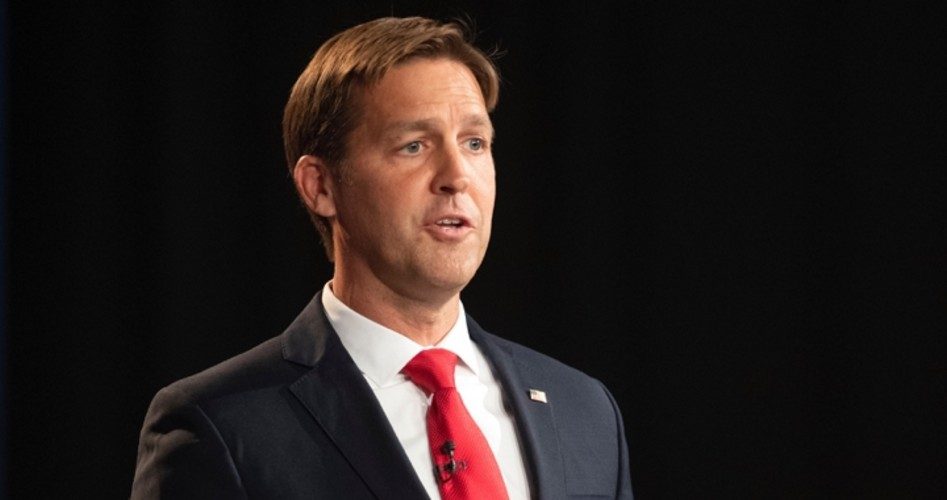
Senator Ben Sasse (R-Neb.; shown) called last week for the repeal of the 17th Amendment — which changed the method of choosing U.S. senators from state legislatures (as designed by the Framers of the Constitution) to direct, popular vote.
While it is unlikely that in the foreseeable future his suggestion could muster the necessary support for another constitutional amendment to throw out the one ratified in 1913, it is a great idea that should be supported.
Sasse made his suggestion in an op-ed that appeared in the Wall Street Journal, entitled “Make the Senate Great Again.”
In his piece, Sasse argued that if state legislatures elected their state’s two U.S. senators, it would give greater control to the states, and reduce the nationalization of politics.
“Different states bring different solutions to the table, and that ought to be reflected in the Senate’s national debate,” Sasse wrote. “The old saying used to be that all politics is local, but today — thanks to the internet, 24/7 cable news and a cottage industry dedicated to political addiction — politics is polarized and national. That would change if state legislatures had direct control over who serves in the Senate.”
The Framers of the Constitution created a federal system of government in which the national government in Washington, D.C., could only exercise those powers delegated to them in the Constitution. All other governmental powers would be left to the states, in what are called the reserved powers. “What would the Founding Fathers think of America if they came back to life?” Sasse asked in his column.
They would most likely wonder how the system they created — federalism — has become so perverted that there is today very little that is not dictated at the national level, rather than at the local level. They would wonder why the American Revolution was even fought, for the purpose of keeping a far-off, distant government (the British Empire) from dictating local matters in the colonies, if today the government in D.C. has dictated all sorts of minute policies for our states, in many cases far beyond what King George III even envisioned.
Several factors could be cited, but along with the 16th Amendment (which allowed Congress to enact a federal income tax), the 17th Amendment (providing for the direct, popular election of U.S. senators) provides the answer. The income tax has given the Congress the money to get states hooked on “federal” dollars, then order them to enact certain policies or face the loss of those dollars. That is why, for example, all 50 states meekly adopted the 55 m.p.h. speed limit in the 70s — because otherwise they would lose federal highway money.
But why does the 17th Amendment severely damage the sovereignty of the states?
At the time of the Constitution’s adoption in 1789, senators were to be chosen by the respective state legislatures for six-year terms, so these senators could be held accountable to the legislature of their state. The idea was that a proper balance between the states and the newly created general government would be more likely maintained if senators were elected by state legislatures. Senators, in other words, were expected to be jealous of any effort by the federal government to encroach upon the constitutionally protected powers of the states.
But then the 17th Amendment was passed, and instead of state legislatures electing the senators, the senators began being elected by all the voters of their respective states, reducing them to little more than glorified House members.
This contradicted the carefully constructed plan of the Founders. Writing in The Federalist, No. 9, Alexander Hamilton explained, “The proposed Constitution, so far from implying an abolition of the state governments, makes them constituent parts of the national sovereignty, by allowing them a direct representation in the Senate.” And, in The Federalist, No. 39, James Madison explained that while the House of Representatives “will derive its powers from the people of America,” the Senate, “on the other hand, will derive its powers from the states as political and coequal societies.” He added that this aspect made the government “federal, not national.”
Madison, writing in The Federalist, No. 62, explained further the reason that each state’s legislature should choose the U.S. senators from their state: “It is recommended by the double advantage of favoring a select appointment, and of giving to the state governments such an agency in the formation of the federal government as must secure the authority of the former.”
Once state legislatures lost this vital check they had on the power of the federal government, by their control over the U.S. Senate, it is not surprising that there has been a dramatic shift in power from the states to the federal legislature. No longer is the Senate a bulwark against those who would centralize more and more power in the hands of the federal government, as the senators are no longer constrained by the concerns of those whose job it is to run state government.
The repeal of the 17th Amendment would no doubt please the Founding Fathers, and should please anyone who supports the concept of federalism. Getting that repeal through the present Congress would be almost impossible, however. But readers can improve those chances by asking candidates for the U.S. House of Representatives and the U.S. Senate if they would support such a repeal, and by joining us in educating the citizens who elect them of the merits of the original concept of electing senators by the state legislatures.
Photo of Sen. Ben Sasse: AP Images
Steve Byas is a university instructor in history and government, and the author of History’s Greatest Libels. He may be contacted at [email protected].



